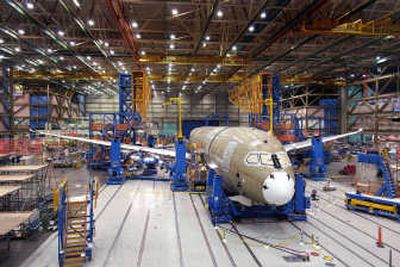787 debut delayed again

CHICAGO – Boeing Co. pushed back its oft-delayed 787 jetliner by another six months Wednesday, postponing the jet’s debut in commercial service until the third quarter of 2009, further jolting the company’s credibility and likely costing it billions of dollars in additional costs and penalties.
The latest delays – the third revision to its delivery schedule and fourth switch in the plans for the first test flight – underscore the problems Boeing is having keeping to a schedule while leaning heavily for the first time on outside contractors to do most of the manufacturing work.
The aircraft touted for its potential to be more fuel-efficient than other large jets is now more than a year behind the original schedule.
The inaugural test flight now isn’t expected to take place until the fourth quarter as Boeing builds more time into the schedule to reduce the risk of further delays. The company had initially planned to begin test flights last August or September and deliver the first plane to Japan’s All Nippon Airways this May – a delivery it had recently rescheduled to early 2009.
The more than 50 airlines that have placed 892 orders for the top-selling plane will be entitled to hefty compensation for the delays, and Boeing’s reputation for reliability also is at stake. The company can ill afford any more program glitches or reneging on schedule commitments if it intends to maintain the momentum the 787 has helped it seize from rival Airbus.
No customer has yet to cancel an order for the new jet, but the backlog is valued at a whopping $151 billion.
The 787, Boeing’s first newly designed jet since airlines started flying the 777 in 1995, will be the world’s first large commercial airplane made mostly of carbon-fiber composites, which are lighter and more durable than aluminum and don’t corrode like metals.
But the unprecedented plan to assemble a jet from components manufactured largely by other companies has run into multiple snags involving outsourcing problems involving contractors in numerous countries.
Pat Shanahan, vice president and general manager of the 787 program, said he’s confident Boeing will hit its new targets because the new schedule has enough wiggle room built into it and because there’s a lower risk of time-consuming surprises in the remaining work on the first airplane.
“There are no technical inventions needed here. It’s a matter of burning through the work,” he said on a conference call.